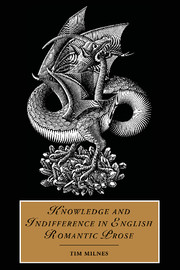Book contents
- Frontmatter
- Contents
- Acknowledgements
- Introduction: Romanticism's knowing ways
- 1 From artistic to epistemic creation: the eighteenth century
- 2 The charm of logic: Wordsworth's prose
- 3 The dry romance: Hazlitt's immanent idealism
- 4 Coleridge and the new foundationalism
- 5 The end of knowledge: Coleridge and theosophy
- Conclusion: life without knowledge
- Notes
- Bibliography
- Index
- CAMBRIDGE STUDIES IN ROMANTICISM
3 - The dry romance: Hazlitt's immanent idealism
Published online by Cambridge University Press: 22 September 2009
- Frontmatter
- Contents
- Acknowledgements
- Introduction: Romanticism's knowing ways
- 1 From artistic to epistemic creation: the eighteenth century
- 2 The charm of logic: Wordsworth's prose
- 3 The dry romance: Hazlitt's immanent idealism
- 4 Coleridge and the new foundationalism
- 5 The end of knowledge: Coleridge and theosophy
- Conclusion: life without knowledge
- Notes
- Bibliography
- Index
- CAMBRIDGE STUDIES IN ROMANTICISM
Summary
Metaphysics themselves are but a dry romance.
William Hazlitt, An Essay on the Principles of Human ActionThe gradual renewal of interest in Hazlitt studies over the past few decades has recently intensified, and in doing so has taken a striking turn. Thanks to the earlier work of students such as W. P. Albrecht, Roy Park, John Mahoney, John Kinnaird and David Bromwich, Hazlitt's intellectual reputation has long since emerged from the shadow of Coleridge, to the extent that it is now unsustainable to characterize him simply as the latter's wayward disciple. As this picture has faded, so too has the image of Hazlitt as the gifted but ‘impressionistic’ critic and prose stylist who might safely be studied with only cursory reference to his works in metaphysics and moral philosophy. Lately, however, Hazlitt has drawn the attention of a number of commentators who have identified in his work a philosophical and theoretical outlook which is not just unique, but internally coherent and (some have claimed) quite ahead of its time. Rather in the manner in which Coleridge's standing as a serious and consistent thinker was assembled over the years despite the dispersed and fragmentary nature of his writings, the fact that much of Hazlitt's philosophical thought (with the notable exception of the Essay on the Principles of Human Action) is scattered throughout a wide range of essays and reviews has not prevented scholars from measuring the telling regularity with which he deploys certain arguments concerning such questions as identity and moral agency, the limits of knowledge, or the nature of creative genius.
- Type
- Chapter
- Information
- Knowledge and Indifference in English Romantic Prose , pp. 105 - 143Publisher: Cambridge University PressPrint publication year: 2003

